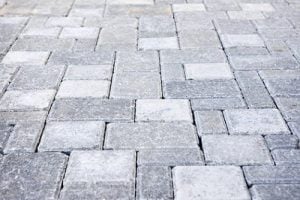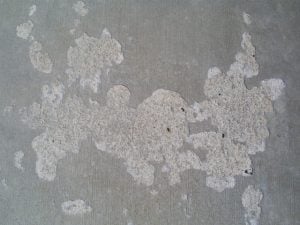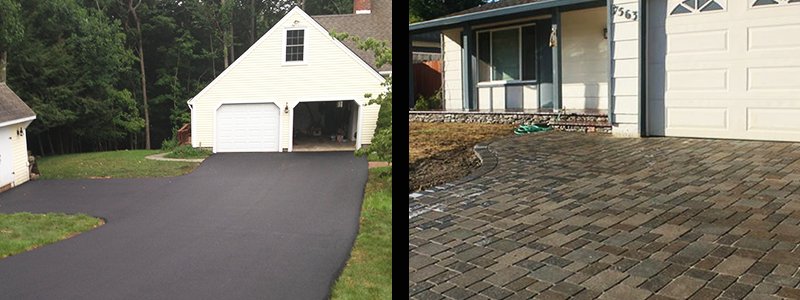 Concrete pavers are becoming increasingly popular, and are most commonly used as driveway pavers or patio pavers. When deciding between concrete or asphalt, it is important to compare the two in several categories first.
Concrete pavers are becoming increasingly popular, and are most commonly used as driveway pavers or patio pavers. When deciding between concrete or asphalt, it is important to compare the two in several categories first.
- Cost
- Durability
- Flaking and cracking
- Maintenance and repairs
- Installation speed and ease
Cost:
As we mentioned in our blog 5 Reasons to Choose Asphalt, asphalt paving is much more cost-effective than concrete. Concrete costs can be as high as double that of an asphalt installation. Not only is asphalt cheaper, but it is also very durable.
Durability:
 Concrete has a tendency to spall, which means the surface of the concrete pavers will flake. Although concrete has an overall longer lifespan than asphalt (30-40 years) if installed correctly, once it has flaked or cracked, it is not easy to repair. Salt is also very damaging to concrete and the pavers are not easy to plow.
Concrete has a tendency to spall, which means the surface of the concrete pavers will flake. Although concrete has an overall longer lifespan than asphalt (30-40 years) if installed correctly, once it has flaked or cracked, it is not easy to repair. Salt is also very damaging to concrete and the pavers are not easy to plow.
Asphalt can withstand the winter pretty well, and is an easier, smoother surface to plow. If you live in an area with harsh winters, asphalt is probably the better option, requiring less maintenance. Additionally, regular maintenance on your asphalt pavement can help to increase its overall lifespan.
Flaking and Cracking:
As mentioned above, concrete is prone to spalling (flaking at the surface), but asphalt too experiences wear-and-tear defects in the form of cracking and potholes. The difference is that asphalt crack filling and pothole patching are extremely easy and cost-effective repairs. If your concrete pavers crack, they cannot be heated and repaired with the same ease.
Maintenance and Repairs:
Generally speaking, concrete may require less maintenance, but the maintenance that it does require is much more challenging and expensive. Your asphalt will need regular consistent maintenance to preserve it and help it to last longer, but the repairs are pretty easy and very cost-effective. Asphalt is also more flexible by nature. Meaning that it shrinks and expands according to weather conditions. This flexibility can cause cracks and potholes, but it also aids in asphalts longevity. It is important to remember that if your asphalt cracks, this does not usually mean that it is failing, and crack filling services will likely do the trick. Additionally, since asphalt is a dark color, oil spills and stains are less noticeable on its surface, contrary to concrete, which is usually a lighter color making stains a big eyesore. Asphalt’s dark color also allows for faster heat absorption, aiding in a quicker melting of snow in the winter.
Installation:
Laying new asphalt is generally pretty quick (about 1-2 days) depending on the size and complexity of the project. Concrete can take a few days longer. The art of laying concrete pavers is much more labor intensive and time consuming itself, but it also takes longer to set. It is recommended to wait about a week to drive on concrete pavers once installed. An asphalt driveway can be driven on much sooner, generally a few hours later, or the next day.
 Before beginning any project on your home or the property you manage, it is important to do your research and consider the pros and cons of your options. For a larger commercial parking lot paving project, (EastCoat Pavement’s specialty) asphalt is almost always the best choice. It is cost-effective, durable, easy to maintain, and better for areas that experience snow (like CT). Our trained team of professionals would be happy to discuss with you in further detail the benefits of asphalt for your parking lot during the planning process of your project! For all of your commercial asphalt paving needs, contact EastCoat Pavement Services today, and receive a free comprehensive consultation!
Before beginning any project on your home or the property you manage, it is important to do your research and consider the pros and cons of your options. For a larger commercial parking lot paving project, (EastCoat Pavement’s specialty) asphalt is almost always the best choice. It is cost-effective, durable, easy to maintain, and better for areas that experience snow (like CT). Our trained team of professionals would be happy to discuss with you in further detail the benefits of asphalt for your parking lot during the planning process of your project! For all of your commercial asphalt paving needs, contact EastCoat Pavement Services today, and receive a free comprehensive consultation!


